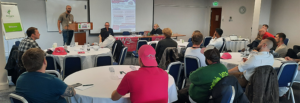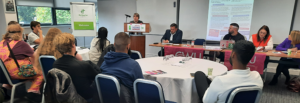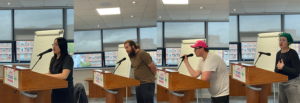Young Workers
October 1 2024
‘Mock Conference’, industrial sessions focussed on key workplace issues, an economics master class, great guest speakers and evening socials added up to a busy 2024 CWU Young Workers Education Event in Cardiff at the weekend…
“Bore da pawb, croeso I digwyddiad addysg Caerdydd Ieuan ydw I a byddaf yn eich host am y penwythnos yma,” were the opening words of Ieuan Davies as he welcomed his fellow young workers to the event and, after translating his introduction into English*, the South Wales Branch rep and Openreach engineer gave a short preview of the agenda and the purpose of the event.
Ieuan was followed by CWU Wales Secretary Mark Williams, who spoke of the rich industrial and trade union history of Cardiff and the south Wales area and of his own family background steeped in the struggles of the working-class movement. Mark gave delegates a warm “welcome to Wales” and wished them a successful and enjoyable couple of days.
(*Good morning all, welcome to the education event in Cardiff. I am Ieuan and I will be one of your hosts this weekend.)
Focus on the workplace…
Three workplace-orientated sessions kicked off the weekend, the first two focussing respectively on our union’s Postal and Telecoms & Financial Services sectors. Assistant secretary Davie Robertson and industrial executive member Luke Elgar led the Postal session. The T&FS panel included deputy general secretary Karen Rose, acting assistant secretary Fiona Curtis, Gemma Hughes, from the union’s national BT Consumer/EE team, and industrial executive member Andy Mercer.
The third of these sessions – Tech and Newly Organising Workers – focused on the CWU’s strategy towards recruiting workers employed outside of our traditional core industries and companies. Lead speakers here were CWU organiser Neil Singh and Duncan Davies, the secretary of the CWU’s new tech-sector national branch (UTAW).
Young postal workers & the fight for fairness

Both Davie Robertson and Luke Elgar referenced the union’s efforts to rebuild after the bitter 2022 Royal Mail dispute, with particular focus on the company’s unagreed imposition of worse terms and conditions for new starters and the CWU’s determined campaign to improve these contracts.
A reduced contributions rate has recently been introduced for those on these worse terms and conditions until such time as a satisfactory agreement is reached on this issue. In the meantime, the best way to strengthen the union’s negotiating position on this is to ensure we recruit new starters into the CWU as quickly as possible.
“We’re fighting hard to address this,” said Davie, while Luke said: “New entrants’ terms and conditions is a massive issue at this time.” Both speakers went on to emphasise the need for young postal workers to put themselves forward for unit rep positions and to be, in Luke’s words “the new generation of reps coming through,” and Davie made the point that “I was a young worker like all of you when I first became a rep. This union needs to always renew itself, with the enthusiasm and energy that younger reps can bring.”
Questions from the floor in this session ranged from the new entrants’ issue to the impacts of network changes, seniority and work pressures from management, with several of the contributions relating direct to the member’s own workplace.

Speaking to CWU News afterwards, Jack Hoyle-Coulhoun said: “This session was really informative and some of the answers will really help me in what I say to new starters at my unit and my branch.” Jack has worked at Aldershot Delivery Office “for nearly a year” and recently took on the role of Young Workers rep for the South East No5 Branch. Charlotte Hoole, who was asked to chair this part of the day, said: “I was a bit nervous at first, but once it got going with Luke and Davie I think it went well.” Charlotte, from the Bootle & Seaforth Delivery Office, explained that she has been elected as unit rep at the office and has undergone some training for the role. “I’m hoping we can turn things round in Royal Mail,” she added.
Muaviz Sharif works a mixture of collections and processing at Leeds Mail Centre and has been two years in the job. “I’m learning a lot about the union here, hearing more about the national picture from the main speakers,” he said. “I’d like to be a workplace rep in the future – if I can get the training.”
Strengthening in T&FS sector – we need you

Karen Rose spoke of the need to recruit and win recognition at telecoms companies outside of BT Group as well as strengthening within Openreach and working within the wider financial services sector. “We need people active at the grassroots. Organising is the key to success,” she insisted, adding: “We need younger workers to be actively involved and to be the face of this union.”
In her speech, Gemma Hughes explained some of the background to winning CWU recognition at EE and the coming together of this business with BT’s Consumer operation. Growing the union further requires members to come forward and volunteer for rep positions or to be points of contact, she continued, explaining that strong teams of workplace representatives are key to growth.
Fiona Curtis gave a round-up of current issues affecting Openreach members, including performance measurement, attendance patterns and the plan to strengthen the union’s representative structures. She pointed out that, while the national negotiators are working hard to make progress on these fronts, pressure from the frontline strengthens their hand. “We need you on the ground, keeping an eye, empowered and equipped to stand up and question things. And also getting messages out there to members.
“We need your voice and we’re stronger together.”
A round of members’ questions and comments followed these speeches, with attendance patterns a key subject as well as the future levels of jobs in engineering going forward. Questions from Consumer/EE members focused on contractual differences and shift scheduling.

James Mason, Openreach engineer from South London, Surrey & North Hants Branch, commented afterwards that “attendance patterns are a particular issue with our members at the moment, so I was glad to get the chance to ask Fiona about this and I’ve got something I can report back to them. It’s my first time at the Young Workers Education Event and so far, I’m really enjoying it, while Marshall Childs, Openreach engineer from Anglia Branch, said: “One of my concerns is relating to seasonal working so it was good that it came up in the session and I can take back with me.”
Georgia Symonds, who works at the Consumer/EE site in Lincoln, said: “I spoke with Gemma after her session and she gave me some really good advice and information. This is the first CWU event I’ve been to and everyone’s been really friendly as soon as I arrived here. I’ve got strong opinions and in the union I can voice my views.”
Spreading our union message wider…

Neil Singh’s opening contribution summarised the efforts that led to recognition being achieved for the first time at a large tooling warehouse in Stoke-on-Trent. One of the newly elected CWU reps at the site, Sean McGinley, talked about how a small number of determined activists had gradually recruited other workers and, with the help and support of CWU organiser Neil, had achieved collective negotiating rights with the Wincanton company a year ago.
The CWU is currently engaged in pay negotiations with Wincanton on behalf of several hundred workers at the site, and has plans to organise and recruit at its other similar sites.
Duncan Davies explained how the United Tech & Allied Workers came into existence, as a collection of activists working in IT and associated sectors, with links to similar groups of activists in other countries. After discussions with the CWU leadership, UTAW became a national branch of the CWU and has, more recently, been placed into the union’s T&FS Constituency.
Efforts are currently being made to recruit and organise within the Apple company and a recognition agreement has been achieved for a group of workers within the SAAB company.
One of the key guest speakers over the weekend, Chloe Rees from Cymru TUC, also discussed this subject, albeit in a wider context. The TUC in Wales is making robust efforts to bring the ideas of trade unionism to hitherto unorganised workers, particularly younger workers, through its ‘NEWID’ project, she told the audience.
NEWID involves visiting workplaces – mostly in the retail and hospitality sector – speaking to workers, asking about their experiences and informing them of the trade union movement. Chloe also regularly speaks about trade unionism to classes in schools, she continued, saying: “I ask them what they’d do if they were forced to come in on Saturdays, or if their summer holidays were stopped – and they react with fury!”
It is by citing these and similar hypothetical instances of imposed injustice, or other forms of grievance that she can establish that addressing these types of issues is what a trade union is for, Chloe explained.
Conference Rocks!

It wouldn’t be the CWU Young Workers Annual Education Event without ‘Mock Conference’ – always a highlight of the weekend and 2024 was no exception.
Shall we ban the wearing of flip-flops or impose a 10pm curfew on conference delegates? How about switching our political affiliation to the Monster Raving Loony Party? Or maybe the CWU should invest in a ‘bot farm’ so that we can flood Elon Musk’s social platform?
This is the part when delegates draft, move, debate and vote on motions, rarely serious, but always in accordance with official CWU procedures.
CWU Standing Orders Committee (SOC) stalwart Paddy Magill spoke to the ‘conference delegates’ before proceedings began, explaining the importance of our union’s annual conference, the difference between its ‘general’ and ‘industrial’ parts and that it is the major decision-making body of the CWU.
Paddy – not a young worker himself despite his youthful looks, but an expert on CWU conference procedure from his long years of SOC service – told participants that, although this session is always a lot of fun, it has a serious purpose, which is to teach young members about how they can send motions into CWU Annual Conference.
“At your Young Workers Annual Conference – which is usually held in January -you’re entitled under rule to send two motions to CWU general conference and one to each of the two industrial conferences,” he said, adding that this ‘Mock Conference’ had become a regular feature of the CWU Young Workers autumn event as it provided an ideal preparation for the more formal Young Workers Conference.
Event organiser Kerry Fleck then asked the different tables of young workers to consider themselves as ‘CWU Branches’ and for each ‘branch’ to draft a conference motion. The motions were then circulated to enable each branch to consider and collectively decide its position on these propositions and to nominate speakers for the debates.
After some passionate speeches, robust arguments and one or two fairly close votes, flip-flops – as well as ‘crocs’ and other toe-revealing footwear – will now be banned from future conferences, although the suggested 10pm curfew went down to a humiliating defeat.
And the CWU will not be investing in its own ‘bot-farm’.
Economics & combatting racism
Dr Steve Nolan, from Trademark, gave the event two detailed presentations. The first, on the economy, was entitled Why You Are Skint and explained the emergence and, subsequently, the dominance of current economic orthodoxy.
His second presentation – Combatting Racism and the Far Right – looked at the reasons why racism flourishes, the conditions that create it, how racist political organisations can grow and how they can be checked and turned back.
Both of these sessions were very well received by the young workers attending, with plenty of questions and contributions from the floor.

Hannah de Oliveira Whitlock
Truro Mail Centre
I’d come again. A lot of people are very passionate to make change and I’ve felt that this weekend. I enjoyed the economics session – about neoliberalism and austerity.
I’d like the union at my workplace to have a stronger presence on my shift and so it would be great to see new reps to greater reflect the wider workforce. I’d love to be a rep.
Morgan Powell
BT Consumer/EE, Swansea
I came because I wanted to get more information of how the union works and it’s been really, really good. As well as the industrial sessions, I’ve also learned about why the financial markets crashed, Thatcher’s legacy and tackling the far-right.
I’d definitely encourage CWU young members to come along to events like these. It’s a good forum for young people to learn in a relaxed environment.
Vanessa Heran-Hua
Software engineer, UTAW Branch
I’ve really enjoyed the weekend. It’s been great meeting other young workers from different companies and sectors. The economics session was really interesting.
It was a good explanation of the issues.
Remembering the miners’ strike…
This year has marked the 40th anniversary of the year-long miners’ strike against pit closures and guest speaker Professor Phil Taylor of Strathclyde University gave a fascinating, thought-provoking and inspiring presentation about that iconic dispute.
“It was the most important strike since the 1926 General Strike,” he began, “and it’s unbelievable what those men and their families went through.”
Phil said that he was angry at how, in his opinion, this piece of working-class history had been misrepresented in the years and decades since the dispute ended in March 1985. “It was a dispute instigated by a ruling class determined to avenge their defeats at the hands of the miners in 1972 and 1974,” he said, briefly explaining how the miners’ union NUM had won those two earlier strikes. The miners had achieved a significant pay rise in 1972 and then, in 1974, the miners’ decision to strike had been the prime cause of the then Conservative Prime Minister calling a snap general election.
Phil recalled: “Edward Heath called that election on the question of ‘Who runs Britain’ – and the voters said: ‘Not you mate’!”
It was the memory of these humiliations in the decade before that had made the Conservative determined to wreak revenge when they had the opportunity to do so in the 1980s, Phil explained, citing the infamous Ridley Plan, which was a blueprint for preparing sufficient coal stocks, then provoking a miners’ strike and having the police ready to prevent effective picketing – which had been a crucial part of the miners’ 1972 victory.
After a year of hard struggle, the miners retuned to work defeated and, in the subsequent years, our UK coal industry was gradually reduced year-after-year until the UK’s last remaining deep coal mine, Kellingley in Yorkshire, closed in 2015.
Although that strike was defeated, Phil made the point that, during the year-long dispute, communities throughout the UK had mobilised in support of striking miners, collecting and sending money, organising benefit events and providing practical assistance to miners and their families. These acts of solidarity were, he said “inspiring” and he gave examples of similar organised working-class solidarity in support of workers in struggle more recently.
Citing the period during the autumn of 2022, when postal workers, BT workers, rail workers, health and education workers and others were in dispute, Phil recalled the creation of the Enough is Enough campaign and the large enthusiastic rallies, protests and marches that it organised.
“As the slogan says: ‘The price of justice is eternal vigilance’. We need to build these solidarity movements.”
Phil’s speech was warmly applauded and sparked a lively discussion from the floor, with several people mentioning their own experiences of the 2022 strikes and the solidarity of that period, while others talked of family history connected with the 1984/85 miners’ strike – one young worker saying that his own grandfather had been one of the strikers.
Source link

